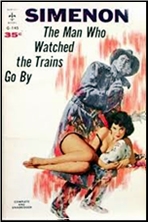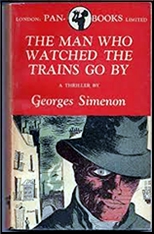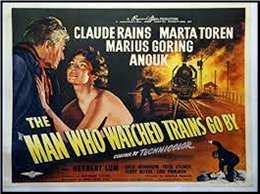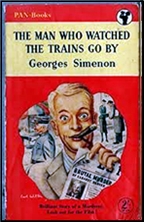Sun 8 Jan 2023
Reviewed by Tony Baer: GEORGES SIMENON – The Man Who Watched the Trains Go By.
Posted by Steve under Reviews[6] Comments

GEORGES SIMENON – The Man Who Watched the Trains Go By. Routledge, UK, hardcover, 1942. Reynal & Hitchcock, US, hardcover, 1946. Translation of “L’Homme Qui Regardait Passer les Trains.†Paris, 1938. Film: Stoss, 1952; released in the U.S. as Paris Express (starring Claude Rains and Märta Torén; screenwriter & director: Harold French).
Kees Popinga is an ordinary guy. He’s general manager for a shipping company. It’s an ordinary job. He’s got an ordinary wife. Couple of ordinary adolescent kids. But he spends his money with class. The best stove. The best of umbrellas. Measured suits. Excellent cigars. The finest of bicycles. A very nice middle class home. The best on the block.
And he’s respected by his peers. He’s in the chess club. He’s quite a bit better than most at it.

And, really, everything could have gone on like this forever.
But by chance enters a bar and sees the owner of his shipping company, an extremely respectable chap, 60-ish, drunk off his ass.
The boss confesses that tonight he’s about to fake his own suicide — as he’s laundered scads of money thru the company, has cashed it out, and the firm’ll be bankrupt this time tomorrow. He’ll be ‘dead’ but really disappeared with a new name, a new life. Destination unnamed.
The boss lectures Kees on the stupidity of the common man. About how all of society is just a bunch of crap. And the common man is just a tool. A tool for the wise guys to use like pawns to do all the dirty work so that the wise guys can live the good life. As an example of ‘the high life’ he regales Kees with tales of conquests, not the least of which is his ‘kept woman’ in Copenhagen — Pamela. A local dancing legend for her lascivious beauty. Kees drools at the thought.

Kees thinks to himself: The Boss thinks he’s the wise guy. But I’ve been wise my whole life too. I always knew my bourgeois life was a bunch of bullshit. I never really liked my wife. I never really liked my house, my kids, my job. I always new it was a bunch of crap. But I never gave myself the liberty to drift. I’ve been faithful. I’ve been a ‘respectable citizen’. But why?
No longer content to watch the trains go by, he jumps the next for Copenhagen to pay a call on Pamela. The luscious, promiscuous Pamela.
Arriving at her rooms, she opens the door. Do I know you, she asks? Kees immediately propositions her. This rotund, middle aged pinhead. He gets straight to the point. Pamela chuckles. What’s so funny, he asks. And she laughs again, this time louder. It’s not funny, he says. Stop laughing. And now she’s hysterical. She cannot stop laughing at this horny toad.

So he strangles her.
That’s what happens when you laugh at Kees Popinga. He is not a man to be trifled with. Humiliated. Who was this whore to ridicule him!
And now. A train for Paris.
The authorities have traced Kees Popinga as far as Paris. But they know not where. Now it’s a game of hide and seek. And his chance to prove he’s smarter than the stupid police inspector.

He is insulted by how he’s portrayed in the papers. They claim he is insane. His wife even says he’s lost his mind! If only they knew. He’s not crazy. He’s always been this way. Only by the greatest secreted repressions has he played the stupid part of the ‘good citizen’ all these years. He’s not crazy. He’s simply finally being completely honest. Completely free.
It’s a good portrayal of how a ‘respectable citizen’ can have a psychotic turn. And interesting that the criminal sees himself as completely sane—while in fact he is losing his grip. But of course the crazy person thinks they’re sane. That’s why they’re crazy!
I personally enjoy Simenon’s romans durs (hard novels) to his Maigret’s. The prose isn’t necessarily that different. But the romans durs are Simenon channeling Jim Thompson. Think The Killer Inside Me with mid-century French manners. With the overlay of WWII and fascism hanging its noir quilt over all of the proceedings.
Made into a 1952 film starring Claude Rains as Kees Popinga:
January 8th, 2023 at 7:47 pm
One of Simenon’s best and though I like the Maigret series, my favorites are the hard novels or stand alone, non-series novels.
January 8th, 2023 at 8:39 pm
I’ve seen the movie, which I thought was very good, but I’ve never read the book. On the Wikipedia page for the book, there is this comment about the film:
“The story was changed to make Kees Popinga into a more sympathetic character ”
Is this a valid statement?
January 8th, 2023 at 9:11 pm
Steve,
I’ve not seen the film. But Claude Rains is a likable actor and the star of the film. I certainly didn’t picture Popinga as Rains when reading the book. In my mind’s eye the character was middle-aged, doughy, puffy, humorless four flusher.
The other thing is that in the film (from the plot synopsis I read) the murdered girl had it coming. In the book she’s completely innocent.
January 8th, 2023 at 10:39 pm
The film was my introduction to Simenon and is quite well done with Rains portraying Kees middle class ordinary persona and his secret arrogance and rage quite well despite being much more of a theatrical presence than the figure in the novel.
Rains was surprisingly good in his few roles as small ordinary men, not exactly his usual screen persona, but well within his skill set.
The real difference between Simenon’s hard novels and Maigret is less in style than substance. However tragic Maigret restores a semblance of order to the world while in the hard novels fate plays cruel games with ordinary lives and even when there is a happy ending a sense of imbalance lingers.
In a Maigret novel the tragedy is at a remove and the reader allowed at least the consolation of a sort of order prevailing. There is no such escape allowed for in the hard novels.
January 9th, 2023 at 8:50 am
Never saw the movie but I did read the book. I had both of the Pan editions shown here. Good book.
January 9th, 2023 at 9:48 am
Watching the trains go by is a metaphor for the life of the good citizen. It’s only when the ‘good citizen’ gets jealous of those actually riding the trains that he goes bad. And once Popinga himself starts riding the trains rather than watching them go by, he can’t stop. Until the end, when he decides to commit suicide by letting the train the run him over. And then, at the last moment, the train switches tracks, leaving him laughing hysterically–all the way to the insane asylum.